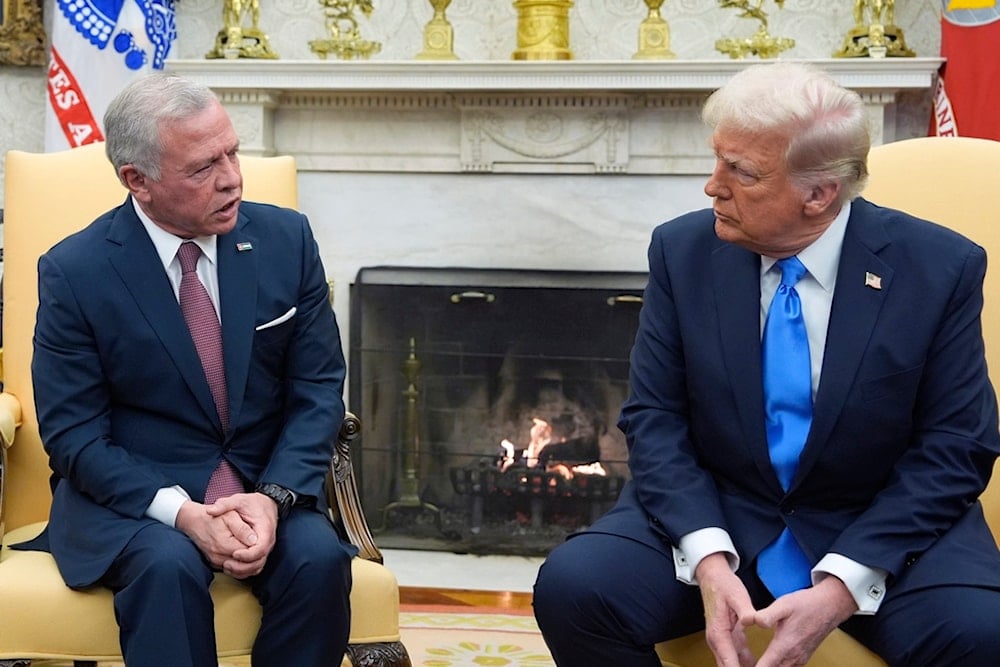Trump pushes for US control over Gaza in talks with Jordan's King
Jordan’s King Abdullah II, who is currently in Washington for high-level meetings, has reiterated his concerns over any forced displacement of Palestinians.
-

President Donald Trump speaks with Jordan's King Abdullah II in the Oval Office at the White House, Tuesday, Feb. 11, 2025, in Washington (Photo/Alex Brandon)
During a White House meeting on Tuesday, US President Donald Trump and Jordan's King Abdullah II discussed the future of Gaza and the potential displacement of Palestinians, a proposal that has ignited strong international backlash.
Trump signaled a dramatic shift in US policy, declaring that the United States would take control of Gaza. When pressed on what legal basis would justify such a move, he stated bluntly: "Under US authority." He added that Gaza's development could eventually bring economic benefits, though he admitted it would take "quite a while."
His remarks follow a wider proposal to forcibly displace Palestinians outside Gaza, asserting that they "will live safely in another location that is not Gaza." He further expressed confidence in securing an arrangement with Egypt, saying he believes "99 percent that we'll be able to work out something with Egypt too."
Arab States Reject Forced Displacement
Trump's proposal has triggered a diplomatic firestorm, prompting Egypt to host an emergency Arab summit on February 27 to address what officials have called "serious developments" regarding the threat to Palestine's existence. Egypt has been leading regional efforts to oppose the plan, coordinating with Jordan, Saudi Arabia, the UAE, and Bahrain.
Jordan’s King Abdullah II, who is currently in Washington for high-level meetings, has reiterated his concerns over any forced displacement of Palestinians. When asked about taking in displaced Palestinians, he stressed the need for a solution that serves "everyone's best interest" and stated, "We should wait to see [the] plan from Egypt." His discussions with US officials are expected to continue, as Jordan remains firmly opposed to any move that could alter the region's demographic balance or fuel further instability.
King Abdullah announced that his country is prepared to accept about 2,000 children from the Gaza Strip who require medical attention.
"I think one of the things that we can do right away is take 2,000 children that are either cancer children or in very ill state to Jordan as quickly as possible," the king stated during a White House bilateral meeting with US President Donald Trump.
At least 2,500 children need immediate medical evacuation, according to Rik Peeperkorn, WHO Representative for the Occupied Palestinian Territory, who made this announcement in January.
Similarly, Saudi Arabia issued a sharp rebuke, dismissing Trump's claim that Riyadh would normalize relations with "Israel" without Palestinian statehood. A source close to the Saudi government stated, "The Saudi crown prince doesn’t want to be seen as being part of what Trump is talking about."
Read more: Saudi normalization plan complicated by Trump's Gaza plan: NYT
Despite regional pushback, Trump signaled that US financial leverage could play a role in these discussions. "We contribute a lot of money," he said, referencing US aid to Jordan and Egypt. However, he insisted that Washington is "above making threats" regarding funding, suggesting that his administration sees cooperation on the Palestinian issue as a priority.
Israeli Enthusiasm
While Arab states have condemned the plan, Israeli right-wing circles have welcomed it. During an Oval Office meeting with Israeli Prime Minister Benjamin Netanyahu, Trump suggested transforming Gaza into the "Riviera of the Middle East" and inviting "the world's people" to settle there.
A senior Israeli official present at the meeting called it "truly historic" and praised the proposal as a "genius solution" to longstanding Israeli concerns. Right-wing Israeli figures interpreted Trump's remarks as a green light for full occupation and settlement expansion in Gaza.
Trump's statements have also raised alarms within his own administration. His comments, made in front of 150 journalists, reportedly surprised even his closest advisors and are expected to complicate ongoing ceasefire negotiations between "Israel" and Hamas.
With Egyptian President Abdel Fattah el-Sisi also expected to meet Trump in Washington soon, the issue is set to dominate regional diplomacy in the coming weeks.

 4 Min Read
4 Min Read








